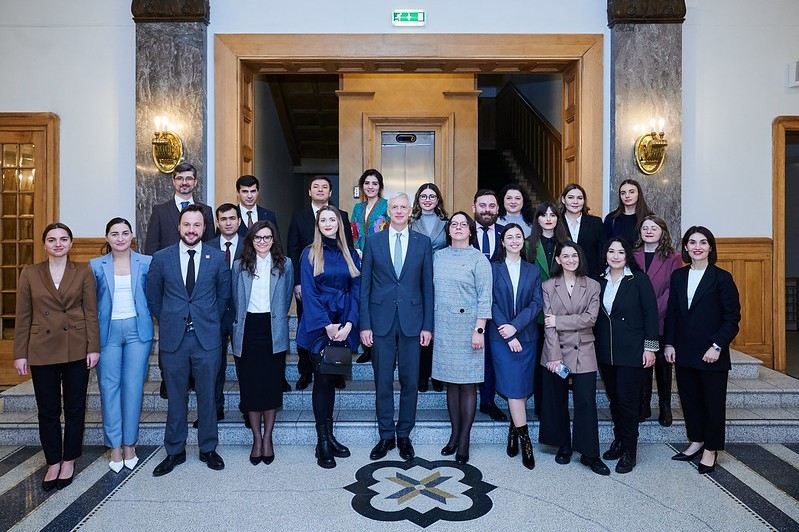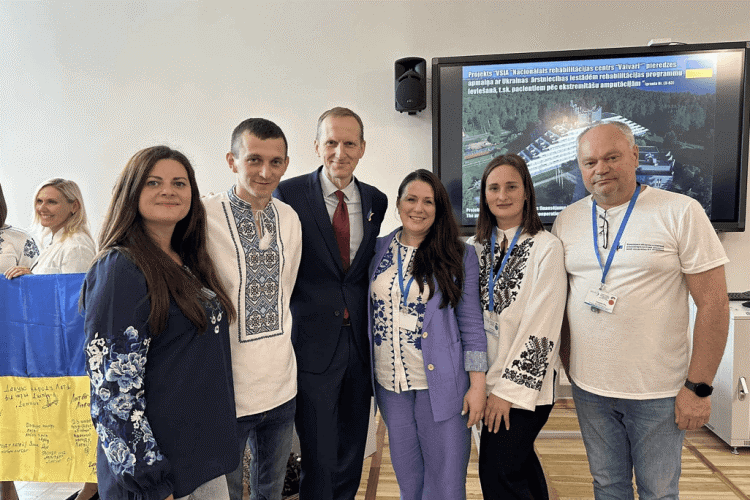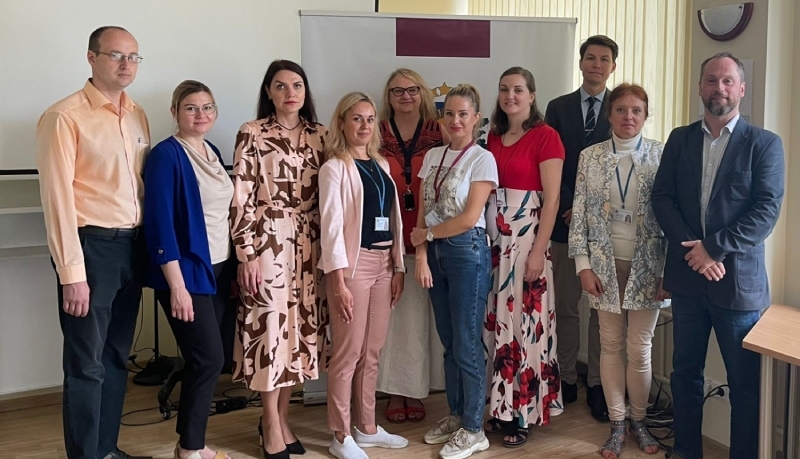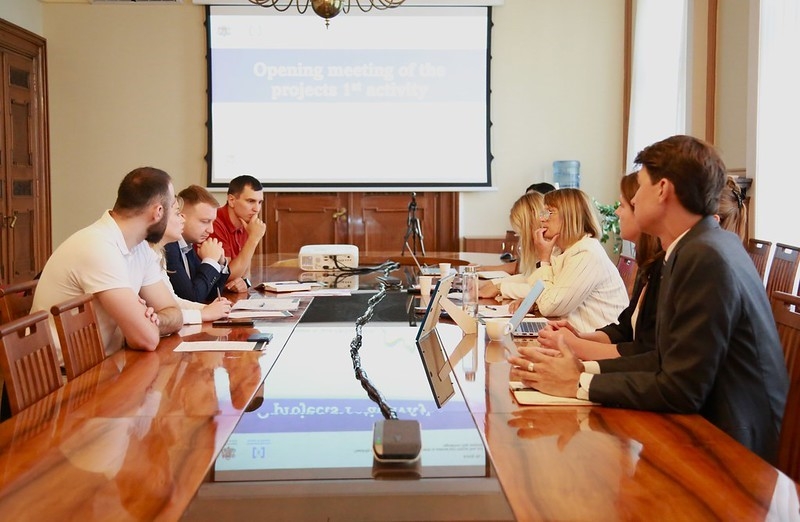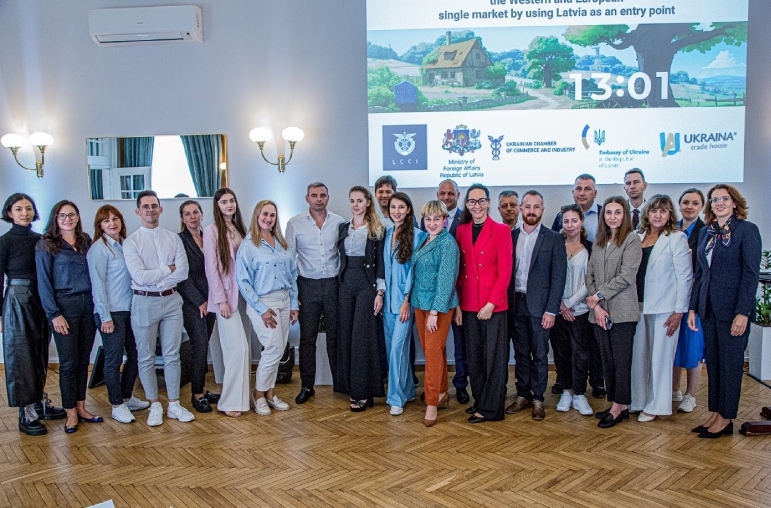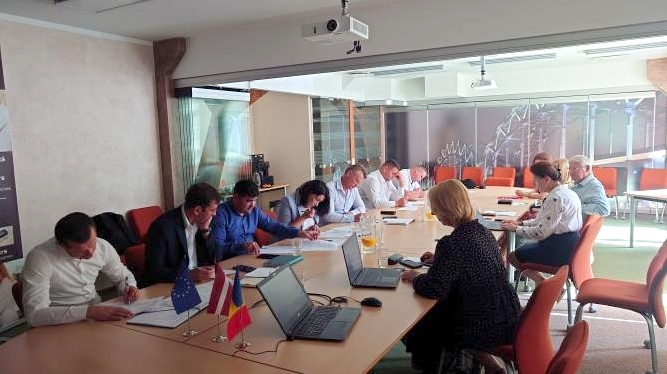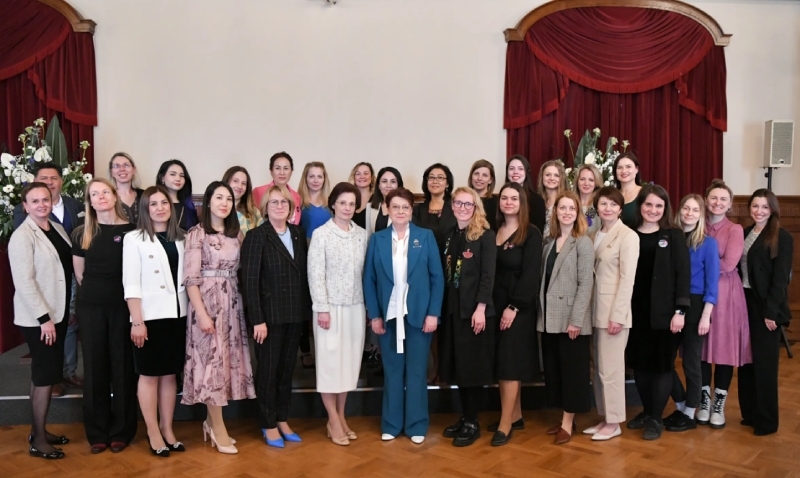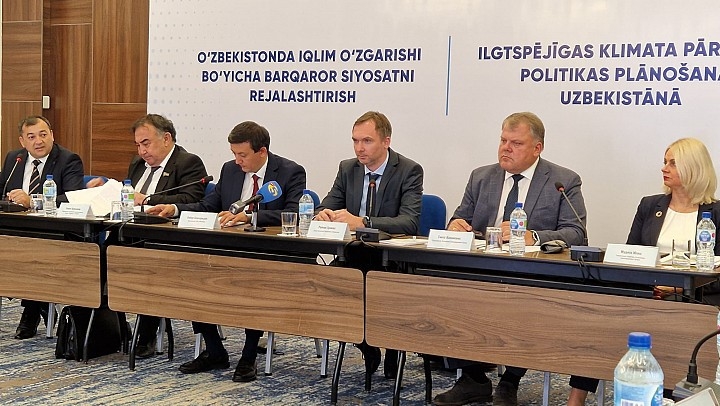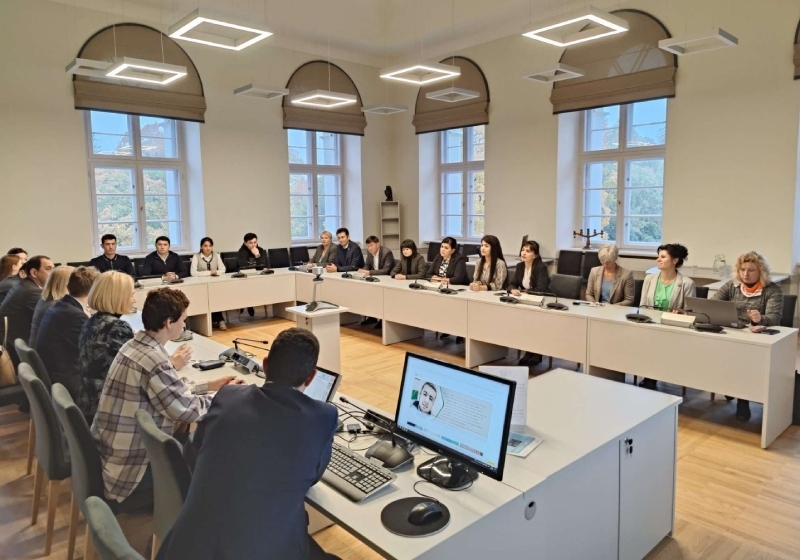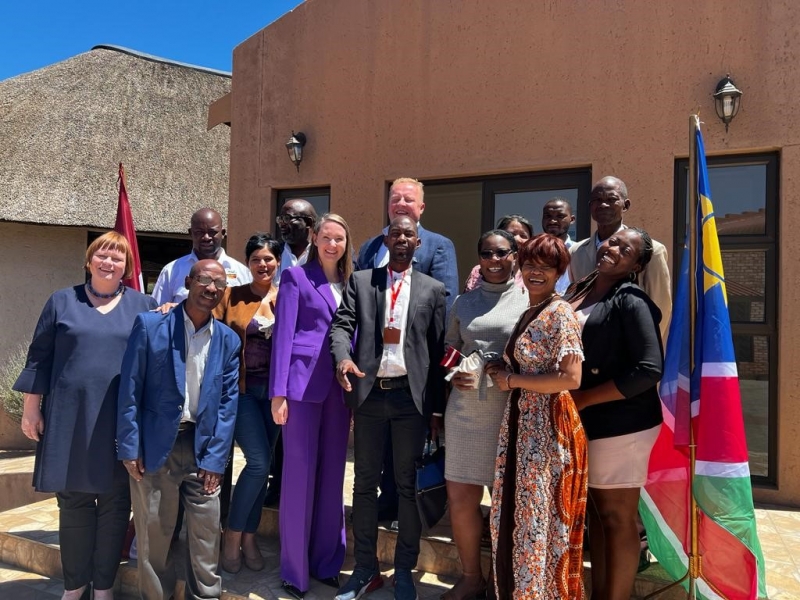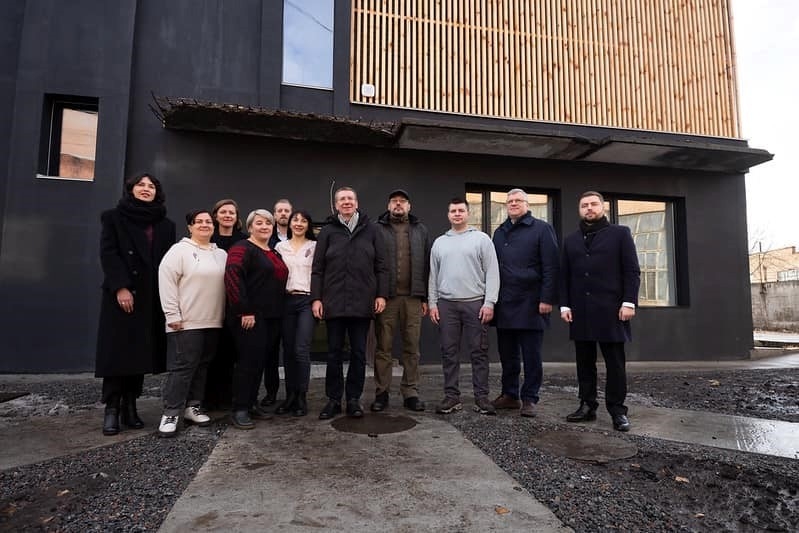In 2023, the budget of the Ministry of Foreign Affairs for bilateral development cooperation was 1 663 813 euros.
The Riga Graduate School of Law has been successfully running programmes in European Law and Economics for countries in the EU’s Neighbourhood Policy region, Central Asia and the Western Balkans since 2014, with financial support from the Ministry of Foreign Affairs and other donors, especially the United States. Over this period, more than 600 participants from 20 countries and territories have completed the programmes.
The Baltic Human Rights Society has been implementing a project in Georgia, Moldova and Ukraine in the field of human rights education. A digital information and education tool – The Human Rights Guide – is being created and adapted to the needs of partners countries.
The State Audit Office has been implementing regional projects in Georgia, Moldova and Ukraine since 2016. With assistance from the Ministry of Foreign Affairs, institutional capacity building is promoted in the areas of financial audits and audit quality control. The project is co-financed by Sweden.
Ukraine
The State Border Guard of the Republic of Latvia supports the strengthening and development of the State Border Guard Service of Ukraine in accordance with EU standards. The project envisages supply of unmanned aerial vehicles, generators and other equipment to the Ukrainian State Border Guard and provision of training courses.
The MARTA Centre helps improve a support system for those affected by the Russian military aggression through mapping facilities for practical, psychological, legal and medical assistance and providing support for the documentation of war crimes and providing psychological assistance to victims.
Since 2022, the National Rehabilitation Centre “Vaivari” has been providing assistance to hospitals in Ukraine with setting up rehabilitation programmes for patients after limb amputations. The project includes experience sharing visits and producing of training materials in the Ukrainian language. In 2023, co-financing from the US was mobilised for the project, and the number of its partners has been expanding to include new Ukrainian medical care institutions.
The Latvian Association of Microsurgeons provides reconstructive microsurgery training to Ukrainian doctors who, upon completion of the training programme, will be able to independently apply that knowledge in the treatment of injured patients, reducing the risk of limb amputation and ensuring the functionality of traumatised limbs.
The State Forensic Science Bureau gives support to the experts of the Forensic Science Institute in Kharkiv with the documentation of war crimes. The project provides equipment and materials urgently needed for documenting and examination of evidence found on the crime scene. Experience sharing is taking place and assistance is rendered in the development and testing of new forensic methods.
Since 2015, the University of Latvia has been implementing its young professional training programme for Ukrainian students, “European Union Studies – Domestic and Foreign Policy”. In 2023, an “EU Studies – Domestic Policy” lecture module on the process of EU accession negotiations and strategies was offered to Ukrainian public administration professionals.
The Ministry of Finance provides support for the Economic Security Bureau of Ukraine with the aim of promoting the establishment and implementation of a system for the protection of the EU’s financial interests. The project comprises enhancement of the legal framework of Ukraine, designing of methodology, and transfer of experience, thereby bringing Ukraine closer to meeting the conditions laid down in the Association Agreement between the EU and Ukraine.
The project implemented by the Latvian Chamber of Commerce and Industry aims to provide support to small and medium-sized enterprises (SMEs) and civil society in Ukraine in order to promote Ukraine’s integration into the EU. The project comprises training for SMEs on EU export standards, digital export tools, the Green Deal, as well as seminars for non-governmental organisations on EU funds, promotion of democratic participation, cyber security, and the fight against corruption.
The Latvian Rural Advisory and Training Centre is implementing a project to promote the competitiveness of small and medium-sized enterprises in Ukraine, which is achieved by increasing the competence level among Ukrainian rural consultants. Latvian experts are sharing their experience in the application of the field demonstration method and the use of digital technologies.
The project of the Riga Investment and Tourism Agency, “The Bridge of Friendship Riga - Nizhyn”, aims to provide psycho-emotional assistance to teachers and local government employees of Nizhyn, share experience and prepare the staff of educational and local government institutions for submission of EU projects. The project envisages training, on-site practice in the Riga City Coucnil, as well as development and implementation of a small-scale pilot project of educational infrastructure.
Moldova
Since 2020, Pauls Stradiņš Clinical University Hospital has been providing support for the development of the health sector in Moldova. In 2023, the project aimed to promote the role of medical institutions in countering disinformation. During the project, communication guidelines for medical institutions on work with refugees are produced and study visits, seminars and lectures are organised.
The Food and Veterinary Service is implementing a project to improve the food, veterinary and phytosanitary border control system of Moldova as an EU candidate country in line with EU requirements. The FVS is carrying out an evaluation of Moldova’s border control system, training of experts and producing recommendations on the necessary amendments to Moldovan legislation in order for it to comply with EU requirements for border controls on the import of animals, plants and food.
Georgia
The project of Pauls Stradiņš Clinical University Hospital aims to strengthen Georgia’s healthcare system. Improvement of the qualifications of administrative and academic staff of medical education institutions, exchange of experience and transfer of knowledge (including in the field of digitalisation), as well as strengthening of civil society by promoting the involvement of students in the non-governmental sector.
The Ministry of Education and Science has been active in the region since 2018, providing continuity to the EU-Central Asia Education Platform. The activities in 2023 aim at engaging in the EU-funded “Action Document for Dialogue and Action for Resourceful Youth in Central Asia (DARYA)” project, strengthening the quality and inclusiveness of education and employment systems and facilitating educational reforms in the region.
Uzbekistan
Experts in geospatial data management systems from SIA SunGIS have been providing support to Uzbekistan since 2019 with the development of a digitalised management system in Uzbekistan. In 2023, the project featured the transfer of Latvia’s expertise through training, the digitalisation of data for water supply and sewerage networks in the pilot territory and input of the data in the pre-developed system.
The Latvian Standard (LVS), in co-operation with the National Metrology Centre of Latvia and the Tilde technology localisation company, provides support for Uzbekistan’s national quality infrastructure institutions. The project comprises administrative capacity building in the field of standardisation and metrology and facilitation of the use of digital technology solutions in improving access to information. The screening and improvement of the laboratory quality management system took place in 2023.
The Riga TechGirls company has been implementing an international initiative, Female Founders Across Borders, since 2022, which promotes the involvement of Uzbek women in entrepreneurship in the field of technology. Drawing on Latvia’s experience in promoting gender equality and entrepreneurship, the project provides support for the creation and development of technology companies founded and run by women.
The MARTA Centre has been working in the field of gender equality (domestic violence, early marriage, women’s economic empowerment) in the region since 2013. In 2021–2023, the centre’s activities in Uzbekistan continued under a UNDP project funded by the European Commission and focused on the provision of public services to women and other vulnerable groups in rural areas, as well as the establishment of Women’s Advisory Groups in seven pilot centres.
The Ministry of Environmental Protection on Regional Development provided support for improving the quality of public service provision in Uzbekistan’s regions. Latvian experts are training employees of the public service centres and devising a tool for the quality assessment of the provision of services in order to improve their quality. The activities have been implemented since 2021 under a UNDP project funded by the EU.
In 2023–2024, the objective of the Latvian Association of Local and Regional Governments was the improvement of sustainable policy planning for climate change mitigation and adaptation in Uzbekistan through capacity building among local self-governments, raising public awareness of the socio-economic impact of climate change and promoting public involvement in decision-making. The project includes the formulation of guidelines for an integrated management of climate change and disaster risk reduction, and recommendations are put forward for the improvement of legislation.
The Latvian University of Life Sciences and Technologies transfers Latvia’s experience in the field of bioeconomy to Uzbek higher education institutions and public authorities, as well as the private sector, by organising an experience sharing programme in Latvia, during which B2B matchmaking events and visits to Latvian bioeconomy companies are held, as well as meetings with Latvian public authorities with the aim of promoting the development of bioeconomy in Uzbekistan.
In 2023 and 2024 the esiLV association, in co-operation with Riga Business School, continues its project “She rebuilds the World” launched in 2022 in Namibia, Zambia and Zimbabwe with the aim of supporting the involvement of women in entrepreneurship. As part of the project, Latvian and international experts share their experience in raising entrepreneurial skills among women, promoting an inclusive and sustainable business environment. The project also transfers Latvia’s experience to civil society organisations in partner countries and employees of public institutions in areas such as innovation in agriculture, promotion of civic participation, and digitalisation of public administration.
In 2023 and 2024, the Riga TechGirls association promotes the interest of school age girls in technology and science in Africa by organising STEM summer schools for girls in South Africa and Cameroon. The aim of the project is to promote, based on the experience of Latvia, the opportunities and interest of girls in choosing careers in the STEM sector.
In 2023, five pre-assessment visits were supported with the aim of promoting cooperation of Latvian project implementers with their partners in beneficiary countries in order to formulate a development cooperation project application. Funding from the Ministry of Foreign Affairs went to support a visit by the Latvian Information Technologies Cluster to Kyrgyzstan, a visit by experts from Bulduri Horticultural School and Pauls Stradiņš Clinical University Hospital to Uzbekistan, a visit by the State Probation Service to Ukraine, and a visit by the Latvian Rural Advisory and Education Centre to Rwanda.
In 2023, Latvia launched a structured support to Ukraine in reconstruction, with the Cabinet having channelled EUR 5.1 million for this purpose. EUR 3.1 million was allocated to the Ministry of Foreign Affairs, EUR 2 million, to the Ministry of Economics. Latvia focuses on the Chernihiv region as a priority region for its reconstruction effort.
In accordance with the Cabinet Order No. 329 of 2 June 2023, the Ministry of Foreign Affairs has used the financing provided for the reconstruction of Ukraine for the following purposes:
- An agreement has been signed between the Ministry of Foreign Affairs and the United Nations Development Programme on the reconstruction of infrastructure facilities in the Chernihiv region (two pre-school institutions, two schools, and the catering block of the Chernihiv Regional Children’s Hospital);
- a Latvian NGO fund “Entrepreneurs for Peace” in partnership with the Agency for Restoration of Ukraine is carrying out a project in Yahidne – the reconstruction o six residential buildings and producing a reconstruction plan for the local community centre;
- a Latvian NGO, the MARTA Centre, in cooperation with Ukrainian partners (NGOs 100% Life and Eleos-Ukraine);
- the Ministry of Environmental Protection and Regional Development (VARAM) provides support to the planning of reconstruction in the Chernihiv region and the supervision of reconstruction processes;
- a Latvian expert on the Ukrainian reconstruction matters seconded to the European Commission.
The Ministry of Economics has supplied modular homes, furniture and children’s playground equipment for pre-school educational institutions, as well as generators to ensure uninterrupted functioning of educational institutions in the Chernihiv region.
The Latvian Development Cooperation Agency (CFCA) is implementing its first pilot project coordinated by the agency in Uzbekistan to support governance and the rule of law, including in the fields of digitalisation and gender equality. The purpose of this pilot project is to strengthen the capacity of the Latvian Development Cooperation Agency in order to promote the full involvement of Latvian implementers in EU development cooperation projects. The agency develops cooperation both with the German Agency for International Cooperation GIZ in the field of administrative reforms and with the EU Delegation (EUDEL) in Uzbekistan in the field of anti-corruption.




